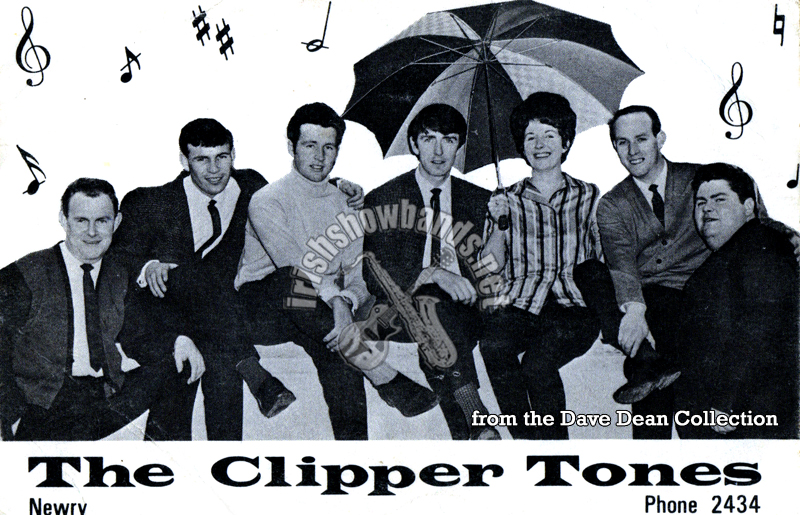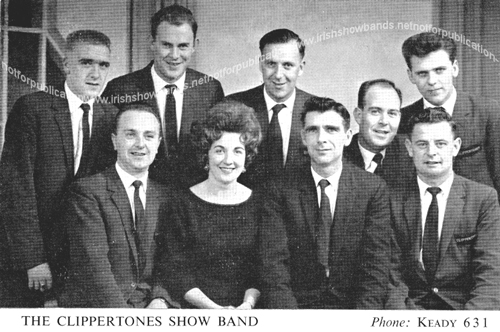|
The Clippertones, Newry |

|
The Story of the Clippertones by Tony Bagnall The Clippertones were once one of the most popular showbands in the nation. In the mid-to-late fifties, the county Armagh band, under the leadership of Keady singer Jim Hughes (who specialised in monologues such as The Drunken Driver) and with the likes of Christy Hughes playing a multitude of instruments such as saxophone, trombone, trumpet, bass guitar and drums, Jim Bann on bass, Joey Dean on drums plus Luke Byrne on trumpet, the country and western-influenced Clippertones went down a bomb everywhere they played. Some others musicians who played in those early Clippertones outfits were accordionist and bassist Brendan Hughes, brother of leader Jim, alto saxophone player Seamus McParland and his singing sister Eileen, ace guitarist Mickey Doran, musical maestro Dick Barton, and the famous Tommy Makem, who would later achieve world fame with the Clancy Brothers traditional group. The Clippers disbanded in 1965 but reformed a year later with the late Big Ivan on lead vocals. The new band consisted of Dermot Mackin on drums and vocals, Kevin McCamley on rhythm guitar, Tony Bagnall on bass, Mickey Mathers on lead guitar, Seamus McParland on alto sax, Liam Mathers on tenor sax and Angela O’Reilly on organ. Big Ivan excelled on numbers such as Five Little Fingers and North to Alaska while Dermot Mackin handled the pop songs of the day. Mickey Mathers added to the band’s repertoire with instrumentals such as the Shadow’s Dance On and he also did excellent guitar versions of Buck’s Polka and Hawaiian Tattoo. Also Angela took centre stage by singing songs such as the Seekers’ Morningtown Ride and Single Girl by Sandy Posey. At the end of the night the Clippertones said goodbye to their audiences with their theme tune, Goodnight Sweetheart, with saxophonists Seamus and Liam taking the limelight. After the Clippertones broke up, Big Ivan made lots of records and became a huge hit on the Irish scene. He will always be remembered for the song he made his own, A Mother’s Love’s a Blessing. Tragically, in 1973, the gentle giant was killed in a car crash coming home from a gig. reproduced courtesy of Tony Bagnall, author of 'Do You Come Here Often?" |
|
Lead Vocals:
Jim Hughes / Big Ivan
McConville Lead Guitar: Mickey Doran / Michael Mathers 2nd Guitar: Bass: Brendan Hughes / Tony Bagnell Trumpet: Luke Byrnes |
Sax/Clarinet:
Seamus Mc Parland / Liam
Mathers / Jim Bann Trombone: Seamus Mulligan Drums: Joey Dean / Dermot Mackin Organ/Piano: Angela Reilly Manager: |
